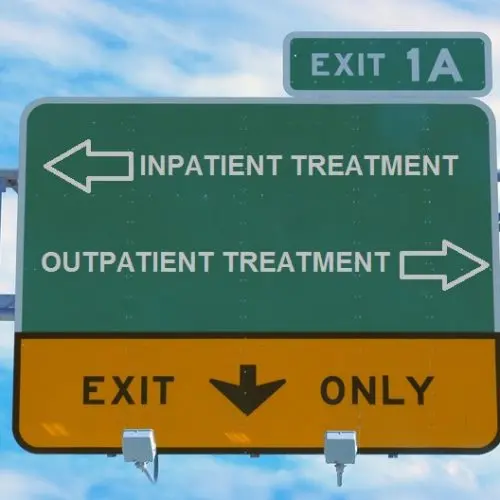Introduction
Inpatient vs. Outpatient Mental Health Treatment differs in that Inpatient care provides round-the-clock supervision in a hospital or facility, while Outpatient care allows patients to live at home and attend scheduled therapy sessions or programs.. Inpatient and Outpatient Mental Health Treatment are the two primary options available for Mental Health care. Each type of care serves a different purpose, catering to the varying needs of individuals seeking support. This article will introduce Inpatient and Outpatient Mental Health Treatments, discuss their features and benefits, and provide guidance on who might benefit from each. Find Inpatient and Outpatient Mental Health Treatment near your zip code.
Your Recovery Starts Today!
Call for Immediate Assistance1-888-546-6005
Inpatient Services: A Comprehensive Approach
Inpatient Mental Health Treatment, or residential treatment, involves staying at a specialized facility for an extended period. Typically, this option is best for individuals experiencing severe Mental Health issues or those needing crisis stabilization.
Features of Inpatient Treatment
24/7 Supervision: Inpatient facilities provide round-the-clock supervision and support, ensuring patient safety and immediate assistance if needed.
Structured Environment: Inpatient Treatment offers a structured daily routine, including group therapy, individual therapy, and recreational activities, fostering a sense of stability.
Medical Management: Many Inpatient facilities have on-site medical staff to manage medication, monitor patients’ physical health, and address any medical concerns.
Multidisciplinary Treatment Team: Inpatient care typically involves a team of Mental Health professionals, such as psychiatrists, psychologists, therapists, and social workers, working together to create an individualized treatment plan.
Benefits of Inpatient Treatment
Intensive Support: Inpatient care provides higher support, ideal for those experiencing acute symptoms or needing crisis intervention.
Safe Environment: The controlled setting of an Inpatient facility can help patients feel secure, allowing them to focus on their recovery.
Peer Support: Residential treatment allows patients to connect with others experiencing similar challenges, fostering a supportive community.
Fewer Distractions: By removing patients from their daily environments, Inpatient care minimizes potential stressors and distractions, helping them concentrate on healing.
Who Benefits from Inpatient Treatment
Inpatient Mental Health Treatment is most suitable for individuals experiencing severe Mental Health issues, such as major depressive episodes, acute anxiety, or psychotic symptoms. Additionally, those in crisis or at risk of harming themselves or others may benefit from the structured, intensive support provided by Inpatient care. The following types of individuals typically benefit from inpatient services:
Individuals experiencing severe mental health symptoms or crisis: Inpatient care is designed for those with severe mental health issues or struggling, requiring immediate intervention, stabilization, and round-the-clock supervision.
People with a high risk of self-harm or harm to others: Inpatient programs offer a safe and secure environment for individuals who may pose a danger to themselves or others due to their Mental Health condition.
Individuals requiring intensive treatment or detoxification: Inpatient services are well-suited for those who need intensive, specialized therapies, such as detoxification for substance abuse or treatment-resistant depression.
People with inadequate support systems: Inpatient care may be necessary for individuals who lack adequate support at home or have an unstable living environment that hinders their recovery.
By providing a controlled environment with constant supervision and access to various therapeutic interventions, Inpatient Mental Health services cater to the needs of individuals with severe mental health concerns, ensuring their safety and promoting recovery.
Outpatient Services: Flexible and Accessible Care
Outpatient Mental Health Treatment allows individuals to receive treatment while continuing to live at home and maintain their daily routines. This option is ideal for those with mild to moderate Mental Health concerns or individuals transitioning from inpatient care to a less intensive setting.
Features of Outpatient Treatment
Flexibility: Outpatient services offer various treatment options, such as individual therapy, group therapy, and medication management, which the providers can schedule around the patient’s availability.
Continuity of Care: Patients can maintain relationships with Mental Health professionals by attending regular appointments and ensuring consistent support.
Cost-Effectiveness: Outpatient care tends to be more affordable than Inpatient treatment, making it a more accessible option for many individuals.
Ongoing Support: Many Outpatient programs offer support groups and workshops, providing additional resources for patients to build coping skills and maintain their well-being.
Benefits of Outpatient Treatment
Integration with Daily Life: Outpatient care allows patients to practice coping strategies and apply therapeutic techniques in real-life settings, promoting long-term success.
Maintaining Personal Responsibilities: Patients can continue fulfilling their work, school, and family obligations while receiving Outpatient Treatment.
Greater Autonomy: Outpatient services give patients more control over their treatment process, fostering a sense of empowerment and independence.
Easier Access: With more Outpatient facilities available than Inpatient centers, individuals can often find care closer to home.
Who Benefits from Outpatient Treatment
Outpatient Mental Health services offer a flexible and accessible option for individuals who require Mental Health support but do not need the intensive care provided in an Inpatient setting. The following types of individuals typically benefit from Outpatient Treatment:
Individuals with mild to moderate Mental Health concerns: Outpatient care is well-suited for those experiencing mild to moderate Mental Health issues that you can effectively manage through therapy, counseling, or medication management without 24-hour supervision.
People transitioning from Inpatient care: Outpatient services can serve as a step-down level of care for individuals who have completed an Inpatient program but still require ongoing support and monitoring as they transition back to their daily routines.
Busy professionals and students: Those with work, school, or family commitments may find Outpatient care more compatible with their schedules, as it allows them to maintain their regular daily activities while receiving Mental Health support.
Individuals seeking specialized care: Outpatient services often offer various technical programs and treatments tailored to address specific Mental Health concerns or populations, such as substance abuse recovery, trauma therapy, or support groups for parents.
Inpatient vs. Outpatient: Making the Right Choice
Comparing and deciding between Inpatient vs. Outpatient Treatment ultimately depends on an individual’s unique needs, circumstances, and the severity of their Mental Health concerns. Here are some key factors to consider when making the decision:
The severity of symptoms: Individuals experiencing severe Mental Health symptoms or crises may require immediate, intensive care provided by an Inpatient program. In contrast, those with milder symptoms may find Outpatient care more appropriate.
Support system: Consider the level of support available at home and within the community. Outpatient care may be more suitable for those with a strong support network, while Inpatient care may be necessary for individuals who lack adequate support or have an unsafe living environment.
Treatment history: If previous attempts at Outpatient treatment have been unsuccessful or if an individual’s condition has worsened, Inpatient care might be a more practical option.
Financial considerations: Inpatient care can be more expensive than Outpatient services due to the comprehensive, round-the-clock care provided. However, weighing the costs against the potential benefits and effectiveness of each treatment option is essential.
Ultimately, when weighing the options of Inpatient vs. Outpatient Mental Health Treatment offer valuable support to individuals experiencing Mental Health concerns. The choice between these two options depends on factors such as the severity of symptoms, available support systems, treatment history, and financial considerations. By carefully evaluating these factors, individuals can make an informed decision about the most appropriate and effective form of care for their unique needs. For a crash course on selecting a suitable Mental Health facility for your loved one, check out our relevant article.
If you’re exploring needs for a loved one over the age of 65, Medicare Pros is a great, easy way to find out what coverage is available for them.







